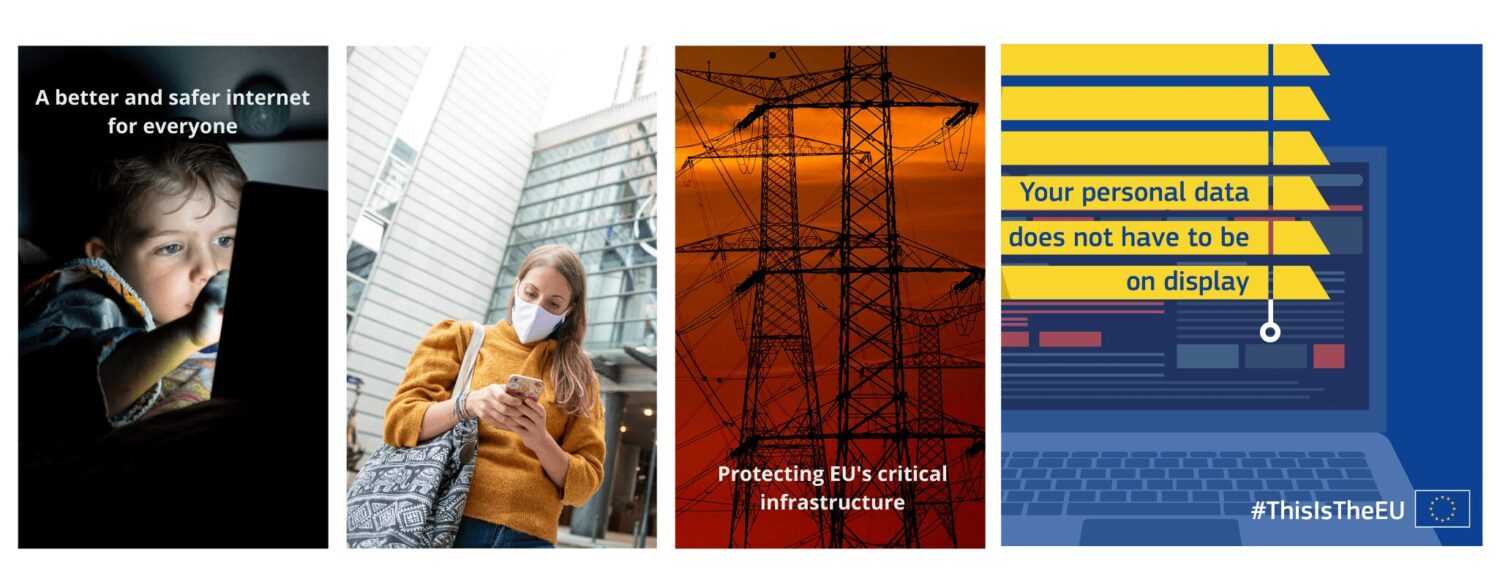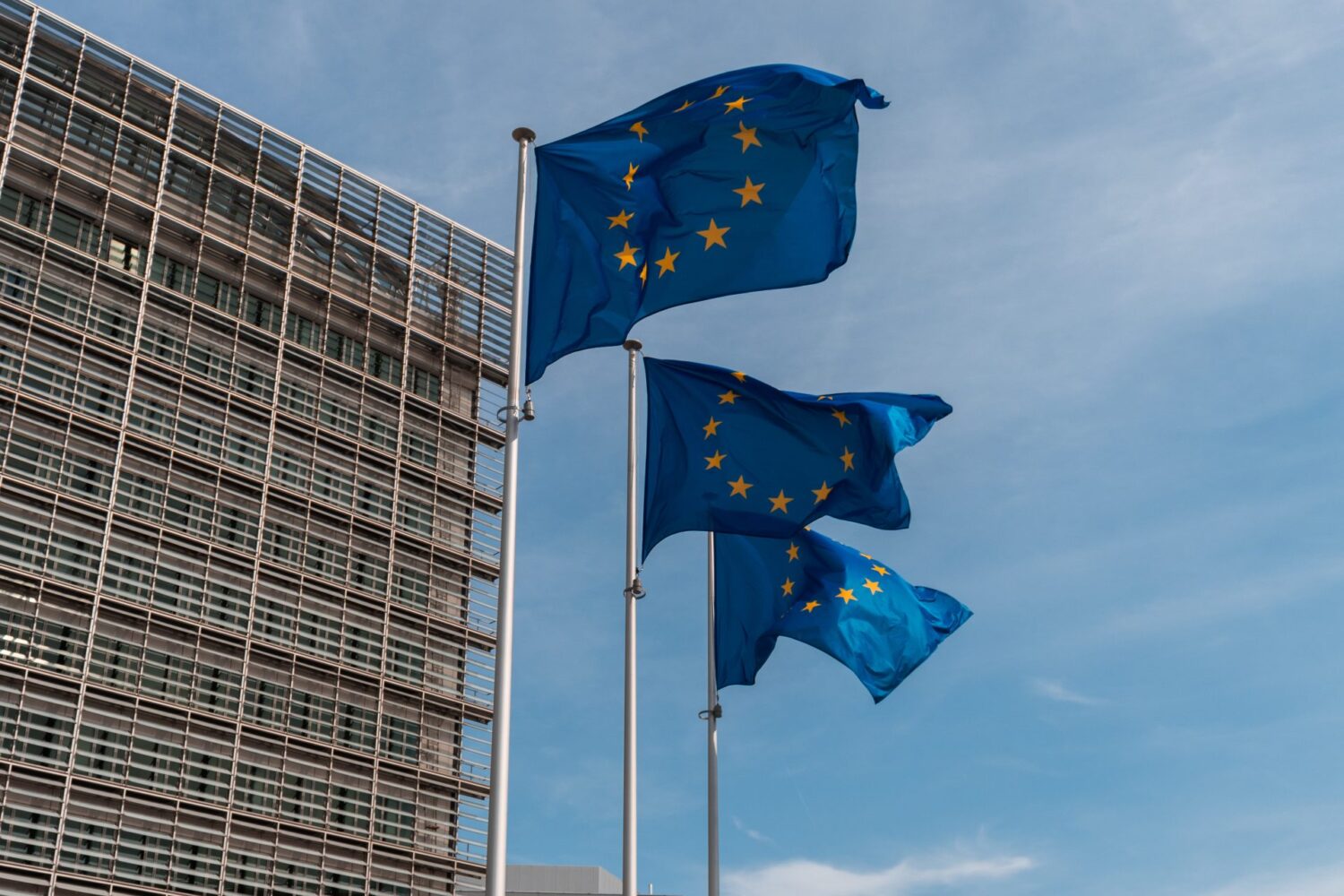We all think this way until it does happen. As more of our life moves online, we need to be aware of how to stay safe.
Did you know that hackers attack an average of 2,244 times a day globally, causing damage to the economy and hurting businesses? They can even have an impact on our personal lives!
Phishing, hacking, data leaks and other cyber threats are among the biggest global risks of the decade after climate change (WEF). This is why one of the top priorities of the EU is to make the internet a safer place for everyone. That means protecting your personal data while you browse, but also safeguarding key infrastructure from cyberattacks, and ensuring we think through the risks of new technologies.
From raising awareness to fighting cybercriminals, here are seven ways the EU works to keep you safe online.
1. Think before you click
October is not only about pumpkins and Halloween: it is also Cybersecurity Month. This year, the European Cybersecurity Month is raising awareness of risks online and encouraging everyone to ‘ThinkB4UClick’.
Being safe online is about getting the basics right. Think before you click, install anti-virus software, choose your passwords smartly, and keep your devices locked when you are away.
These are simple tips and tricks you can follow to protect yourself online.
2. Protecting the little ones
Today, young Europeans are growing up with YouTube and Instagram. The internet opens doors to many new experiences, stimulating learning and creativity. However, children can also be exposed to online bullying and sexual harassment. This is why the EU has put in place several measures to protect them, foster digital literacy and fight against online child sexual abuse.
For instance, the EU provides a support network to every European country with a Safer Internet Centre, which you can call free of charge to seek help from experts on consent, data protection, online privacy and more.
3. With strong EU rules, your privacy matters
When you access the web, you often entrust personal information, such as your name, address, and credit card number, to your Internet Service Provider or to the website you are using. Most commonly, you give your personal data in exchange for a service or information.
EU rules such as the ePrivacy Directive and the General Data Protection Regulation (GDPR) ensure that this data is treated carefully, does not fall into wrong hands and that you have more control over how it is used. The EU is proud to have the strongest and most modern Data Protection rules in the world, rules which are becoming a global standard.
4. Digital skills make the world go round
The EU has taken the lead on cryptography know-how and cybersecurity. However, as in any fast-paced field, keeping pace with the needs of the cybersecurity industry and investing in new digital skills is crucial.
The EU has taken many steps to encourage the development of digital skills by modernising education. The EU provides grants for master’s, PhD and post-graduate research and promotes upskilling and reskilling opportunities, with a particular emphasis on digital skills.
With more trained IT and cybersecurity professionals and a more digitally-skilled public, we are all safer online.
5. Working together to fight cybercrime and prevent attacks
Increased cyber attacks during the coronavirus crisis have shown how important it is to protect our hospitals, research centres and other infrastructure. Cybersecurity is one of the Commission’s priorities and the Recovery Plan for Europe includes additional investments in cybersecurity. We are also taking strong action to strengthen cybersecurity capacities: we will soon update legislation in the area of cybersecurity, with a new Cybersecurity Strategy coming up by the end of 2020, and will invest in cybersecurity research and capacity building.
Whether you are buying products in online shops, making bank transactions or searching for a job, a lot of your personal data is shared online. Cybercriminals aim to intercept online banking transactions, steal identities and harass people. This is why the Commission monitors and updates EU law on cybercrime and supports law enforcement capacity across EU countries. We are also working with the European Cybercrime Centre in Europol, the central hub for criminal information and intelligence. It offers operational and analytical support to investigations in all EU countries.
On top of that, the European Union Agency for Cybersecurity, ENISA has a very wide ambit and works on various topics including protecting smart grid electricity networks, eHealth systems, big data and much more. It provides support to all EU countries and ensures cybersecurity is embedded across all domains of EU policy.
In a hyperconnected world, ENISA aims to prepare Europe for the cyber challenges of tomorrow.
6. Thinking ahead on 5G networks — extra speed with extra protection
A revolution in how we stay connected is just around the corner. 5G is the 5th generation of mobile networks designed to meet society’s increased data and connectivity demands at greater speeds.
5G will have an impact on every aspect of our lives — from smart medicine and remote-controlled machinery to more efficient energy grids and connected cars.
To protect these future networks, we have had to change the way we think about security, which is not only a national issue but also a common challenge. The EU is working to provide guidance and measures to mitigate the new risks that come with 5G.
7. Tackling disinformation online
Nope, the Earth is not flat and no, 5G does not cause COVID-19. Seems straightforward, and yet we find disinformation everywhere online, also amplified by social media.
Online disinformation can have far-reaching consequences. It is a threat to democratic debate, and puts our health, security and environment at risk. The EU is therefore working to implement a clear, comprehensive and broad set of actions to tackle the spread of online disinformation in Europe.
On top of that, the European Union Agency for Cybersecurity, ENISA has a very wide ambit and works on various topics including protecting smart grid electricity networks, eHealth systems, big data and much more. It provides support to all EU countries and ensures cybersecurity is embedded across all domains of EU policy.
In a hyperconnected world, ENISA aims to prepare Europe for the cyber challenges of tomorrow.
6. Thinking ahead on 5G networks — extra speed with extra protection
A revolution in how we stay connected is just around the corner. 5G is the 5th generation of mobile networks designed to meet society’s increased data and connectivity demands at greater speeds.
5G will have an impact on every aspect of our lives — from smart medicine and remote-controlled machinery to more efficient energy grids and connected cars.
To protect these future networks, we have had to change the way we think about security, which is not only a national issue but also a common challenge. The EU is working to provide guidance and measures to mitigate the new risks that come with 5G.
7. Tackling disinformation online
Nope, the Earth is not flat and no, 5G does not cause COVID-19. Seems straightforward, and yet we find disinformation everywhere online, also amplified by social media.
Online disinformation can have far-reaching consequences. It is a threat to democratic debate, and puts our health, security and environment at risk. The EU is therefore working to implement a clear, comprehensive and broad set of actions to tackle the spread of online disinformation in Europe.
We aim to be a leader in the fight against online disinformation and the threat it poses to our shared values and democratic systems.
More info:
- Safer Internet Centres: Across the EU, these centres offer support to people facing problems online.
- EU Data protection rules
- ENISA
- Enhancing digital skills
- Recovery Plan for Europe














